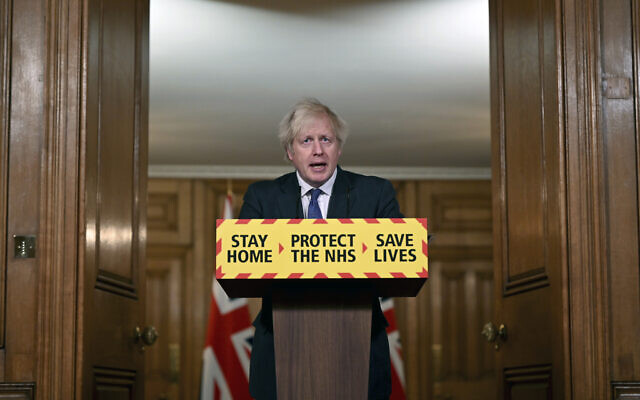‘We will have to live with coronavirus in one way or another for
a long while to come,’ says Boris Johnson; scientists caution
research still in early stage.
There is some evidence that a new coronavirus variant first identified in southeast England carries a higher risk of death than the original strain, the British government’s chief scientific adviser said Friday — though he stressed that the data is uncertain.
Patrick Vallance told a news conference that “there is evidence that there is an increased risk for those who have the new variant.”
He said that for a man in his 60s with the original version of the virus, “the average risk is that for 1,000 people who got infected, roughly 10 would be expected to unfortunately die.”
“With the new variant, for 1,000 people infected, roughly 13 or 14 people might be expected to die,” he said.
But Vallance stressed that “the evidence is not yet strong” and more research is needed.
However, he said, there is growing conviction that the variant is more transmissible than the original coronavirus strain. He said it appears to be between 30% and 70% more easily passed on.
“I don’t think this virus is going anywhere,” he said. “It’s going to be around, probably, forever,” Vallance said.
Herd immunity in Israel
Asked about the report, a top Israeli expert said that the UK variant will make it much more difficult for the country to reach herd immunity.
Noting it was “much more contagious,” Prof. Gili Regev of the Sheba Medical Center in Tel Aviv told Channel 12 that instead of being able to achieve herd immunity after vaccinating between 60 to 75% of the population, Israel would now possibly have to vaccinate more than 75% and possibly even 90%.
“This means it will take a lot longer, particularly as we are not vaccinating children,” she said.
“We are a long way from the end of this pandemic,” said Regev, but noted that Israel was ending the first phase of the struggle with COVID-19.
In Israel, almost 2.5 million people have received the first dose of the vaccine by Friday, and nearly 900,000 of them also received a second dose.
Regev said that her hospital had noted a “significant” drop in infections and a jump in antibodies in those who had received a second dose and anticipated that this would start to impact virus numbers in the coming weeks.
Health Ministry Deputy Director Itamar Grotto told Channel 13 on Friday that health officials fear the entrance of more virus variants from abroad. They are recommending reducing international travel.
“Within the country, we are successfully vaccinating and the lockdown is starting to show results,” Grotto said, but due to variants, “… our recommendation is to reduce as much as possible travel to and from Israel for a short time.”
After more Israelis are vaccinated, the public will be better protected against future outbreaks of virus variants and travel restrictions could ease, he said.
Studying the new variant
Maria Van Kerkhove, the World Health Organization’s technical lead on COVID-19, said studies were under way to look at the transmission and severity of new virus variants.
She said so far “they haven’t seen an increase in severity” but that more transmission could lead to “an overburdened health care system” and thus more deaths.
British officials say they are confident that the vaccines that have been authorized for use against COVID-19 will be effective against the new strain identified in the country.
But Vallance said scientists are concerned that variants identified in Brazil and South Africa could be more resistant to vaccines, adding that more research needs to be done.
Concerns about newly identified variants have triggered a spate of new travel restrictions around the world. Many countries have closed their borders to travelers from Britain, and the UK has halted flights from Brazil and South Africa.
Prime Minister Boris Johnson said there could be further restrictions.
“We may need to go further to protect our borders,” he said.
Britain has recorded 95,981 deaths among people who tested positive for the coronavirus, the highest confirmed total in Europe.
The UK is currently in a lockdown in an attempt to slow the latest surge of the coronavirus outbreak. Pubs, restaurants, entertainment venues and many shops are closed, and people are required to stay largely at home.
The number of new infections has begun to fall, but deaths remain agonizingly high, averaging more than 1,000 a day, and the number of hospitalized patients is 80% higher than at the first peak of the pandemic in the spring.
Johnson, who has often been accused of giving overly optimistic predictions about relaxing coronavirus restrictions, sounded gloomy.
“We will have to live with coronavirus in one way or another for a long while to come,” he said, adding that “it’s an open question” when measures could be eased.
“At this stage you’ve got to be very, very cautious indeed,” he said.
(Times of Israel).
